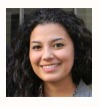 Grecia Chantalle Saldana, intercultural educator for human rights
Grecia Chantalle Saldana, intercultural educator for human rights
“International educational exchange is the most significant current project designed to continue the process of humanizing mankind to the point, we would hope, that men can learn to live in peace.”
—Senator J. William Fulbright
Senator Fulbright’s message is one that Grecia Saldana lives by, along with, “If you think education is expensive, try ignorance.”* Her many endeavors revolve around building bridges of communication and intercultural understanding through education.
Her linguist father motivated her to major in modern languages at the Universidad De La Salle Bajío in León, Guanajuato, Mexico. Acquiring multiple languages has allowed her to participate fully in an increasingly diverse society and to understand the mindsets of people in different regions of the world. Her interest in cultures outside her own led her to become an exchange student in Toronto, Canada where she lived for five months with a Portuguese family and eight different students from all around the world, gaining lifelong friends. “I loved being around them and learning how cultures shape how we think, act, and react,” Grecia says.
Upon returning to Mexico, she applied for another academic exchange, this time to southernmost Brazil, in part to build on her newly acquired Portuguese. She soon relocated to Novo Hamburgo, settled by German immigrants in the Nineteenth Century, and found the people to be cheerful, their language beautiful, and their music full of life. In noting cultural differences, Grecia gained a richer understanding of her own culture as she assimilated the Brazilian worldview. She gave talks about Mexican culture in the Universidade Feevale where she studied and in an elementary school and created two videos, one in Portuguese, the other in Spanish, encouraging citizens of Brazil and Mexico to visit each other. Both Universidad De La Salle Bajío and Universidade Feevale currently use those videos in their international fairs to motivate students to study abroad.
Back at her university in Mexico, Grecia decided her experiences could enrich instructional material. She began tutoring French at her University and in January of 2012 launched a project called HAMOM, Hagamos un Mundo Mejor, teaching English to poor children in Guanajuato for a year. She established ESL curricula, recruited more volunteer teachers, and organized presentations and festivals.
After completing her degree, she returned home where her attention fell on one of the most vulnerable indigenous groups in her state of Nayarit, the Wixáritari or Huichol. Along with three other ethnic groups, the Coras, Tepehuanos, and Mexicaneros, they are despised by people in big cities and constantly judged by their appearance, dress, cults, and traditions.
At the Universidad Autónoma de Nayarit, Grecia took lessons in Wixárika from a Wixáritari professor, allowing a better understanding of their culture. In exchange, she taught “French for Traveling Purposes.” She attended all the Huichol/Wixáritari student association’s events. To help provide work for people living on $2 a day, she hopes to organize a small business selling Huichol beaded shirts, jewelry, art, and cards with symbols and stories to tourists and at expos and fairs.
To learn more about undeveloped regions and the programs that governments have implemented in order to lower the levels of poverty, Grecia took an online course titled, “Savoirs Contre Pauvreté,” analyzing the flaws and advantages of different governmental and NGO measures worldwide in health and education. The course awakened her to the field of humanitarianism. She now wants to pursue a Master’s degree in Human Rights and Humanitarian Action at L’Universite de Sciences Politiques, an international university in Paris, France. After finishing her master’s degree, she hopes to work in an international organization such as the UN or UNICEF in Mexico and create an NGO that aims to defend human rights of the indigenous groups in Mexico.
*The education/ignorance quote is widely and incorrectly attributed to former Harvard president, Derek Bok. Many have used it or paraphrased it, such as Abraham Franklin of Mexico and President Obama.
